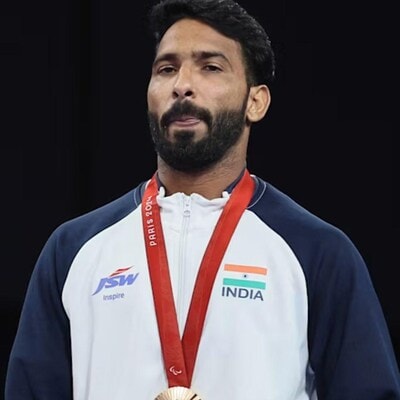[ad_1]
Visually impaired but extremely positive, history-making Indian Paralympic medallist Kapil Parmar faced constant taunts from his fellow villagers when he started para-judo eight years ago, but it only strengthened his resolve to do something significant in life.
The 24-year-old Parmar became India’s first Paralympic medallist in judo when he won a bronze in men’s 60kg (J1) in Paris Games on September 4.
“When I decided to start para judo in 2017, some people of my village taunted me how I would play the sport as I can’t see but you always move ahead because of these taunts only,” Parmar told PTI in an interview.
“You have to take these (taunts) in a positive way, to convert their taunts into a challenge and prove them wrong. Now, after my achievements, they support me and say that I was right in choosing para-sport.
“If you have sympathisers and supporters, there will be haters also. Life is like that. In a way I feel haters had made me move ahead in life.”
The J1 class in para judo is for athletes who suffer from no to very low visual activity. Athletes in this category wear red circles to indicate that they may need guided support before, during and after a contest.
Son of a taxi driver, Parmar’s eye-sight deteriorated progressively after he was electrocuted as a nine-year-old while trying to fetch water from a water pump in the fields of his village near Sehore in Madhya Pradesh.
He was discovered in an unconscious state by a fellow villager and was hospitalised in Bhopal. He spent six months in coma before making a slow and painful recovery.
“When I came out of coma and recovered, the doctor said I should do some activity so that I gain weight. I don’t know how my weight increased. I never thought I would win a Paralympics medal one day.”
The limited financial means of his family meant that Parmar had to run a tea stall with one of his four brothers to support himself at one stage of his life. Initially, he had to ask for financial help from other people to take part in tournaments.
His training was later taken care of by the Indian Blind and Para Judo Academy in Lucknow where he is currently based.
Asked why he chose para-judo, he said, “Before my tragic incident, I used to play wrestling, so I chose judo because of similar nature and thought it could be suitable for me.
“Later, I came to know about Paralympics. I thought I can win medal in Paralympics. That way I can do something significant for my parents and the country.
“I started winning medals at national and international events. I am world number one for the last one year. So, I had the confidence to win a medal in Paris Paralympics,” said Parmar who had won a silver in the Asian Para Games last year.
Parmar received Rs 30 lakh for winning the bronze in Paris. He has also received cash awards after winning silver in the Asian Para Games last year. He is under the government’s Target Olympic Podium Scheme.
He said his family’s financial condition has improved as his father no longer drives taxi and his mother has also stopped working as farm labourer.
His training rigours are hectic if he is participating in a major championships. Otherwise, his coach Munawar Anzar lets him enjoy normal life at home, fearing too much of training could affect his behaviour.
“Before big tournaments, we would have one month training, otherwise 15 or 20 days before an event. He used to take part in at least four or five tournaments in a year. So, it’s at least four to five months training in a year. Sometimes, they remain two or three months continuously in Lucknow for training.
“But we try to give them breaks in between and let them spend their time with family. If we keep them under training for longer period, it will affect their behaviour. We have to treat them delicately.
“When a big competition comes, we do three sessions of training in day. In the morning, we do physical fitness, that is ground training like running, stretching etc. We do weight training in the afternoon and in the evening, we do mat training. Strength, fitness and sound technique is the mantra.”
Before the Paris Games, Parmar had gone on a 15-day training stint in Osaka in Japan and that helped him in his performance.
“He trained with able-bodied athletes in Japan. He trained with top level university players there. This training stint really helped him.”
Asked if he sometimes harboured any thought of running away to home because of hard training, Parmar said, “No, never. I enjoyed it. Now more enjoyment will come when I win gold in LA 2028.
(Only the headline and picture of this report may have been reworked by the Business Standard staff; the rest of the content is auto-generated from a syndicated feed.)
First Published: Sep 11 2024 | 6:27 PM IS
[ad_2]
Source link

